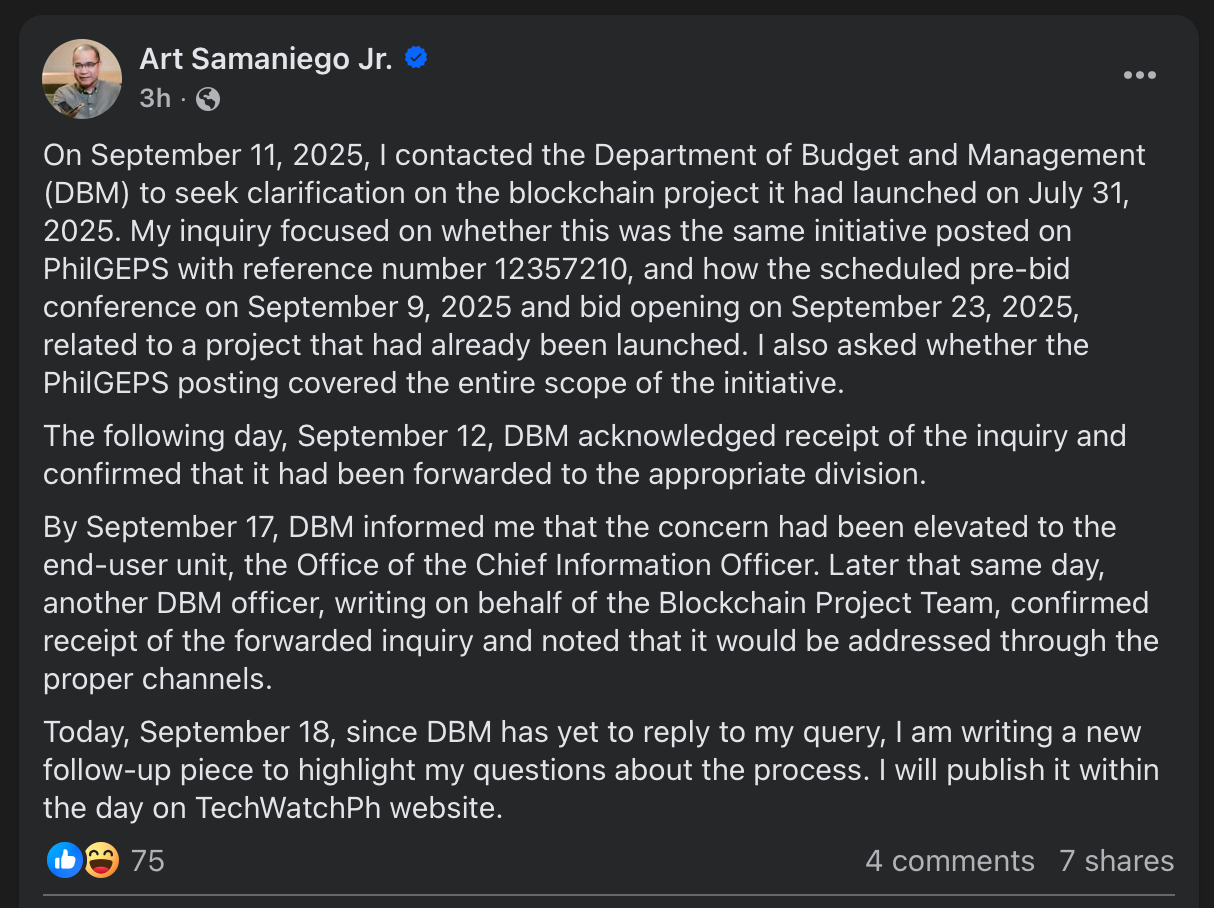DBM’s Blockchain Project Raises Eyebrows Amid Procurement Timeline Discrepancies
As legislative proposals to integrate blockchain into government systems gain traction both in the Senate and Congress, the Department of Budget and Management (DBM)—named in several key bills as a lead implementing agency—has found itself at the center of public inquiry. The issue: questions about a blockchain project it reportedly launched before the completion of the very bidding process meant to select its vendor.
The project in question, officially titled “Subscription to Immutable and Verifiable Attributes (Blockchain) for A

DRS,” was publicly associated with DBM’s digital reform agenda and reportedly launched on July 31, 2025. However, the same project also appears on the Philippine Government Electronic Procurement System (PhilGEPS) under reference number 12357210, with a pre-bid conference scheduled on September 9 and a bid opening on September 23.
This apparent inconsistency prompted Art Samaniego Jr., a respected technology journalist at TechWatch PH and Co-Founder in ScamWatch, to publicly raise the matter. In a series of public posts, Samaniego expressed concern about the timeline, asking how a project could be launched before the completion of its own procurement cycle. He asked in his post, “Ang tanong ko, how can one project be awarded, launched, and still up for bidding at the same time? Ibang blockchain project ba to?,” emphasizing that his aim was not to speculate but to request clarity, given the potential implications of the timeline.
Samaniego first reached out to DBM on September 11, submitting a letter to inquire whether the launched blockchain initiative was the same one listed on PhilGEPS, and whether the procurement process had concluded prior to public launch. He also asked whether the public listing covered the full scope of the project. On September 12, DBM acknowledged receipt and confirmed that the inquiry had been forwarded to the appropriate division. On September 17, the Office of the Chief Information Officer and the DBM Blockchain Project Team confirmed that they had received the concern and would respond through proper channels.
As of September 18, however, Samaniego had not yet received a formal reply. This failure to immediately provide a definitive clarification signals internal misalignment, as if the department is taking a runaround before actually answering the question. Consequently, in the absence of an official explanation, he announced that he would publish a follow-up editorial on TechWatch PH to chronicle his communication with the agency and reiterate his questions.
This request for clarification comes at a time when multiple blockchain-related bills are moving through Congress. Senate Bill No. 1330, House Bill No. 4380, and House Bill No. 4489, among others, seek to institutionalize blockchain as a tool for budget transparency. In each of these measures, DBM is explicitly named as a lead implementing agency, tasked with integrating national financial systems into blockchain-based infrastructures.
It is within this broader policy context that the concern over DBM’s procurement timeline gains urgency. Samaniego’s inquiry highlights a key principle that any government technology initiative must uphold: transparency is not just a benefit of blockchain—it is a requirement for its credibility. Without clear procedural compliance and public communication, even well-intentioned digital reforms risk losing public trust.
To date, there is no indication of wrongdoing. The questions raised are simple: Is the project launched in July the same one still open for bidding on PhilGEPS? If so, why was it announced before the bidding process concluded? If not, is there another blockchain initiative under DBM’s pipeline? And does the listed bidding cover the full scope of the project already unveiled?
Samaniego’s appeal raises a valid concern rooted in due diligence. His call for clarity underscores how important it is for government agencies to model the very transparency they aim to build into digital systems. It also reminds the public and policymakers that new technologies do not automatically guarantee new standards of governance.
The emergence of blockchain legislation has inspired enthusiasm, but it also demands scrutiny. Agencies like DBM are at the frontlines of digital transformation and must set the tone for procedural rigor, clear communication, and unambiguous accountability—before, during, and after implementation.
.svg)


.svg) SHARE TO FACEBOOK
SHARE TO FACEBOOK SHARE TO TWITTER/X
SHARE TO TWITTER/X SHARE TO LINKEDIN
SHARE TO LINKEDIN SEND TO MAIL
SEND TO MAIL


.svg)


.svg)